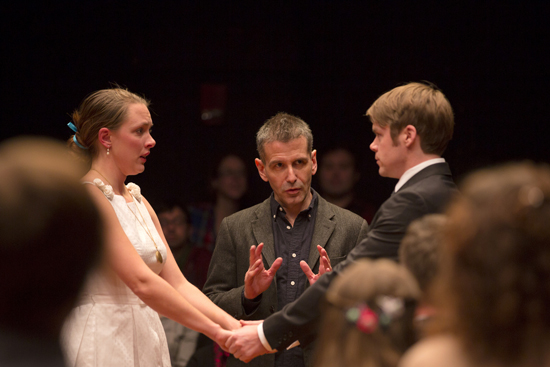Bringing Our Town to Our Town
Huntington's latest rediscovers what's surprising in Wilder classic

Therese Plaehn as Emily (from left), David Cromer as the Stage Manager, and Derrick Trumbly as George in the Huntington Theatre Company’s production of Thornton Wilder’s Our Town. Photos by T. Charles Erickson
When Thornton Wilder’s Our Town debuted on Broadway, it was considered radical. The playwright’s direction called for the drama to be staged without “the old-fashioned traditions of naturalistic stage design.” Reviewing the original 1938 production, critic Brooks Atkinson wrote in the New York Times that “by stripping the play of everything that is not essential, Mr. Wilder has given it a profound, strange, unworldly significance.”
As part of the Huntington Theatre Company’s 31st season, a brand-new production by noted director David Cromer opens tonight at the Calderwood Pavilion at the Boston Center for the Arts.
Wilder’s play tells the story of a group of average townsfolk living in fictional Grover’s Corner, N.H., at the beginning of the 20th century. Centered around one young couple—George and Emily—the play traces their lives as they fall in love, marry, start a family, and are separated when Emily dies in childbirth. The drama culminates in Emily’s third act revelation that humans fail to “realize life while they live it…every, every minute.”
Our Town, which earned Wilder a Pulitzer Prize, has become the most frequently produced play in America. It was made into a rarely seen 1940 film, has been adapted for television several times, and has often been revived for the New York stage, most recently by Cromer.
Cromer first directed the play in Chicago in 2008, to ecstatic reviews. It then transferred to a small off-Broadway theater, where it ran for more than 600 performances—the longest run in the play’s history. Cromer later restaged the show in Los Angeles in a production starring Helen Hunt.
As in the New York production, Cromer will perform double duty in the Huntington version, both directing and playing the pivotal role of the Stage Manager through most of the show’s run.

Cromer says the challenge in directing Wilder’s classic is to strip the play of artifice—which in this case means not only no scenery, curtain, or props, but no period costumes—all, he says, in an attempt to bring modern audiences closer to Wilder’s characters. “It wasn’t a case of changing it from what it was, but trying to get closer to what it had been like to see it originally, back in 1938,” says Cromer. So much of what was branded radical back then, he says—the elements of direct address, flashbacks, the fourth wall, dialogue that addressed what happened to people after they died—have become staples of the theater in the intervening decades. “We looked at all those things and thought, if we gave them a slight tweak, they could become surprising again.”
Theatergoers expecting to see a sentimental, nostalgic look at the past are in for a surprise. “I think it’s a surface reading of the play that it advocates small town values or suggests that it was a simpler time and things were nicer,” says Cromer. “I think the play says, ‘This is this town, these are these people, and they are as lost and fumbling as anyone else.’” Cromer points to a line uttered by the character Mrs. Soames to make his point. “She says, ‘My, wasn’t life awful and wonderful.’ This is it: it is awful and it is cruel and it is lovely.” Referring to another character, Cromer notes, “Simon Simpson says in Act Three that that’s what it was to be alive—to go about in a cloud of ignorance, to run around trampling on the feelings of those around you. To spend and waste time as though you had a million years.”
Cromer’s affiliation with Our Town was a game changer for him professionally. He won two Lucille Lortel Awards in 2009, for Best Revival and Best Direction, and a MacArthur Foundation fellowship, known as the genius grant, the following year. In the past four years, he has become one of the most sought-after stage directors on Broadway and in regional theater. He recently mounted Broadway revivals of John Guare’s The House of Blue Leaves and Neil Simon’s Brighton Beach Memoirs and earlier this fall directed an acclaimed production of Tennessee Williams’ Sweet Bird of Youth, starring Diane Lane, for Chicago’s Goodman Theatre—a production rumored to be headed to New York.
In casting the Huntington production, Cromer says, he was looking for actors “who don’t see their line as a moment to do something clever, cry, scream, or point or do something funny and then shut down when it’s the other person’s turn. I’m looking for an actor who’s just very simply and straightforwardly alive…I think people in real life are doing very little performing, and so I wanted actors who are doing very little performing while playing these people.”

The Huntington cast includes two BU alums, actress and playwright Melinda Lopez (GRS’00), a Creative Writing Program adjunct assistant professor and author of Sonia Flew, produced by the Huntington in 2004, as Mrs. Gibbs, and Nicholas Carter (CFA’11), who plays Sam Craig.
“I imagine people will come out of the theater really different from when they entered,” says Lopez. “The audience leaves having experienced a profoundly emotional journey with these characters.”
The actress says she sees many parallels between her own life and that of her character. “People think they know these old-timey farm women,” she says, describing her character’s marriage as complicated. “I’ve been married 18 years, she’s been married 20 years, and boy, I get it. I get what you choose to say in a marriage, what you hold onto, what you carry through your life, the dreams you give up, the dreams you hold onto.”
Lopez says that “what’s interesting about Our Town is that we think we know it. We think we remember it, maybe we read it in high school. But believe me, you don’t know the play.”
This production marks a debut of sorts for the Huntington. It is the first of the company’s productions to be staged in the intimate Roberts Studio Theatre at the Calderwood Pavilion.
Our Town runs through January 26, 2013, at the Calderwood Pavilion at the Boston Center for the Arts, 527 Tremont St., Boston. Tickets may be purchased online, by phone at 617-266-0800, or in person at the Calderwood Pavilion box office. Patrons 35 and younger may purchase $25 tickets (ID required) for any production, and there is a $5 discount for seniors. Military personnel can purchase tickets for $15, and student rush tickets are also available for $15 with a valid ID. Members of the BU community get $10 off (ID required). By public transportation, take the MBTA Green Line to the Copley Square stop or the Orange Line to Back Bay. Follow the Huntington Theatre Company on Twitter at @huntington.

Comments & Discussion
Boston University moderates comments to facilitate an informed, substantive, civil conversation. Abusive, profane, self-promotional, misleading, incoherent or off-topic comments will be rejected. Moderators are staffed during regular business hours (EST) and can only accept comments written in English. Statistics or facts must include a citation or a link to the citation.